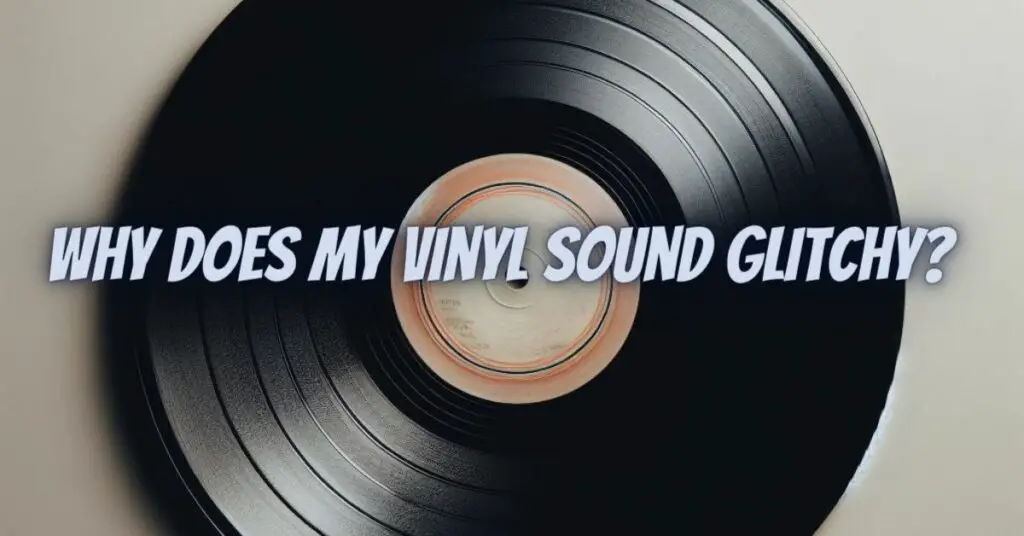Vinyl records have long been cherished for their analog warmth and rich sound quality. However, even the most dedicated vinyl enthusiasts occasionally encounter an issue that can disrupt their listening experience: glitchy or distorted sound. If you’ve ever wondered, “Why does my vinyl sound glitchy?” this comprehensive guide will explore the common causes of glitches in vinyl playback and offer practical solutions to help you enjoy your vinyl records in all their analog glory.
Understanding Vinyl Playback
Before delving into the reasons behind glitchy vinyl playback, it’s crucial to have a basic understanding of how vinyl records work and the components involved in vinyl playback:
- Grooves and Groove Modulations:
- Vinyl records store audio information in grooves that spiral from the center to the edge. These grooves are modulated to represent different audio frequencies and channels.
- Stylus and Tonearm:
- The stylus (needle) mounted on the turntable’s tonearm tracks the grooves on the vinyl, translating the physical grooves into electrical signals.
- Phono Preamp and Amplification:
- The electrical signals from the stylus are sent to a phono preamp, which amplifies the weak signal and prepares it for playback through speakers or headphones.
Common Causes of Glitchy Vinyl Playback
When you encounter glitchy or distorted sound while playing vinyl records, several factors may be responsible for the issue:
- Dirt and Dust on the Record:
- One of the most common culprits is dirt, dust, or debris on the surface of the vinyl record. These particles can interfere with the stylus’s tracking and cause glitches in playback.
- Worn or Damaged Stylus:
- An old or damaged stylus can result in erratic tracking and misalignment with the grooves, leading to distorted and glitchy sound.
- Turntable Calibration Issues:
- Incorrect turntable setup, including improper tracking force, anti-skating adjustments, or tonearm balance, can affect playback quality and introduce glitches.
- Dirty or Faulty Contacts:
- Dirty or corroded contacts in the tonearm or cartridge connections can lead to electrical interference, causing sound glitches during playback.
- Warped or Damaged Records:
- Vinyl records that are warped or have physical damage, such as deep scratches or gouges, can cause the stylus to jump or skip, resulting in glitches.
- Grounding and Electrical Interference:
- Improper grounding of the turntable or interference from nearby electronic devices can introduce noise and glitches into the audio signal.
Troubleshooting and Solutions
To address the issue of glitchy vinyl playback and restore the pristine sound of your records, consider the following troubleshooting steps:
- Clean Your Records:
- Regularly clean your vinyl records using a carbon fiber brush or a wet cleaning solution. Removing dust and debris from the record’s surface can significantly improve playback quality.
- Check and Replace the Stylus:
- Inspect the stylus for wear and tear. If it’s damaged or worn, replace it with a new one to ensure proper tracking and playback.
- Calibrate Your Turntable:
- Verify that your turntable is correctly calibrated, including tracking force, anti-skating, and tonearm balance adjustments. Consult your turntable’s manual for guidance.
- Clean Contacts and Connections:
- Clean the contacts and connections in your turntable’s tonearm and cartridge connections. Use contact cleaner or isopropyl alcohol for this purpose.
- Inspect Records for Damage:
- Carefully examine your vinyl records for visible damage. Handle them with care to avoid introducing new scratches or warping.
- Address Grounding and Interference:
- Ensure your turntable is properly grounded, and minimize electrical interference by placing it away from other electronic devices.
The allure of vinyl records lies not only in their rich analog sound but also in the tactile experience of handling physical media. When your vinyl playback sounds glitchy or distorted, it can be frustrating, but it’s a challenge with practical solutions. By taking the time to clean your records, maintain your turntable, and inspect your stylus and records for damage, you can restore the pristine sound quality of your vinyl collection.
Troubleshooting and resolving playback issues can enhance your vinyl listening experience, allowing you to savor the nuances of your favorite music with clarity and fidelity. Whether you’re a seasoned vinyl enthusiast or new to the world of analog sound, understanding the causes behind glitchy playback is essential for preserving the integrity of your vinyl collection and ensuring an enjoyable listening experience.


